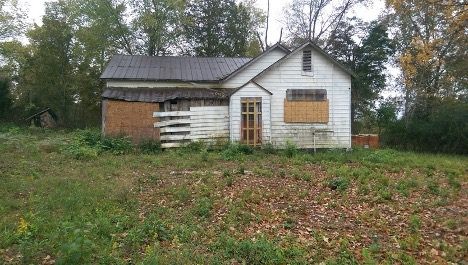A Forgotten History Gains New Ground
By Katie Shands
Photos Courtsey of Heritage Foundation of Williamson County
In the wee hours of February 2nd, a flatbed truck carried unusual cargo through the darkened streets of Franklin. If any downtown residents happened to be awake and look out a window, they might have seen a dilapidated schoolhouse rolling past. The Lee-Buckner Rosenwald School was on the last leg of its relocation, which had begun more than two hours earlier on an overgrown lot in the Duplex/Spring Hill community. The trip ended at Franklin Grove Estates and Gardens, a property owned by the Heritage Foundation of Williamson County. Although this seventeen-mile move was a major milestone, it was only part of the school’s much longer journey from obscurity and the brink of destruction to national prominence.In the early 20th century, most African American schools in the South suffered from underfunding and serious disrepair. Seeing this deficiency, Booker T. Washington, founder of the Tuskegee Institute, joined forces with Julius Rosenwald, philanthropist and president of Sears, Roebuck & Co., to build over 5,000 schools for African American children in fifteen states. From 1917 to 1932, Rosenwald schools educated 663,625 students, including such luminaries as poet Maya Angelou, civil rights activist Medgar Evers, and former Congressman John Lewis.
Although the Rosenwald schools didn’t directly challenge segregation, they did help bridge the educational gap between white and African American children. According to the National Trust for Historic Preservation, the effort has been called “the most important initiative to advance Black education in the early 20th century.” And yet, despite this incredible history, many of these schools have been overlooked or torn down. Only ten to twelve percent remain intact today.
In Williamson County, four Rosenwald schools were built. Constructed in 1927, Lee-Buckner was the first of those schools and the last remaining one in the county today. This Rosenwald school filled a great need for the small community of Duplex. Until then, the area’s children had been educated at Rural Hill, a circa-1868 log structure that served as both a school and Methodist church. For thirty years, African American students in grades first through eighth had met in this dim, poorly ventilated space.
Monroe Lee, a local man whose family co-founded Rural Hill, sold land to Williamson County for the construction of Lee-Buckner in 1925. The project was jointly funded by the county’s board of education, private donors, and the Rosenwald Fund. The resulting schoolhouse was typical of Rosenwald’s progressive designs, prioritizing natural light and proper ventilation. It was built facing north-south with windows on the east and west sides to maximize sunlight and reduce eye strain for the students. Vents were installed beneath the eaves to create a cross-breeze. The school even sat on short piers to reduce moisture beneath the structure.
As Lee-Buckner grew, the lower grades met at Rural Hill until an addition to the Rosenwald school was built in the late forties to early fifties. However, despite its integral role in the community, Lee-Buckner suffered the same fate of so many other African American schools in the South. Public school officials began to neglect the school, and by 1951, Lee-Buckner was in disrepair yet deemed “structurally sound” by county surveyors.
Throughout the 1950s and 1960s, rural schools in the South began to be consolidated and ultimately integrated. In 1965, Lee-Buckner closed its doors, and students relocated to the newly constructed Evergreen school near Thompson’s Station. The county sold Lee-Buckner to private citizens who used it as a residence. By the 1990s, the structure was vacant, its peeling paint and boarded-up windows belying its historic significance.
The Heritage Foundation of Williamson County purchased the schoolhouse in 2018, preventing its demolition by developers who had bought the property. Now, with the school’s relocation to Franklin Grove complete, the foundation envisions a vibrant future for Lee-Buckner. They plan to restore the building and install an interpretive exhibit detailing its history, as well as a rotating one about African American history. The project is expected to be completed by late 2025 or early 2026.
Against all odds, Lee-Buckner has come full circle, once again operating as a center of education and community. This modest schoolhouse’s journey stands as a fitting testament to the collective experience of its students and the community it once served: resilience in the face of adversity and the power of education to open new doors. With this restoration comes an opportunity for these voices of the past to be heard, and that’s a story worth listening to for generations to come.
A special thanks to Rachael Finch, the Heritage Foundation’s preservation consultant, for her extensive research on the history of Lee-Buckner.






.png)




























